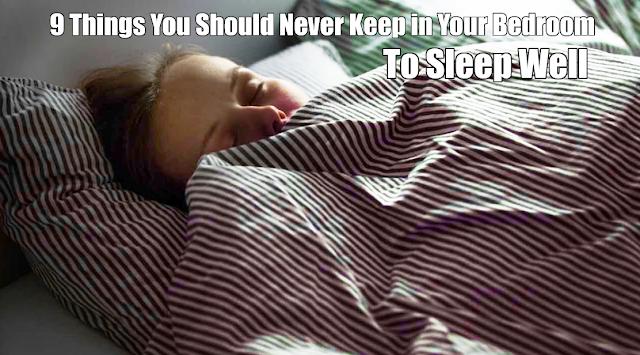A restful sleep is essential for daily activities. Here are 9 things you should not put in your room to sleep well. The bedroom is a place that should be arranged in the best possible way to promote sleep. Indeed, a messy, dusty or cluttered room can hinder our nights of sleep. However, we know that humans spend a third of their lives sleeping and that sleep plays an essential role for the body and the mind. In this sense, discover the 9 objects that should not be put in your room to create an environment conducive to relaxation.
Third of the population is prone to sleep disorders. The consequences of too short or disturbed nights have repercussions on mental and physical health, hampering the development and well-being of many individuals. In fact, sleep promotes cell regeneration and improves our cognitive processes. What if the problem was caused by the conditions in which you sleep?
Discover 9 things you should avoid putting in your bedroom to help you fall asleep and get restful sleep.
9 things you shouldn't put in a bedroom
This list contains items that many people keep in their bedrooms. But to improve sleep and establish healthy habits, it is necessary to sort out and get rid of all those things that affect your well-being.
1. Electronic devices
Some people can't help but look at their smartphones before sleeping. Unfortunately, this habit affects the quality of sleep. Indeed, the blue light that this device diffuses disturbs the biological clock, slowing down sleep and promoting wakefulness. Thus, all electronic devices can cause this phenomenon, namely the television, the telephone, the tablet as well as the computer.
2. Documents
Sometimes we are tempted to finish our work at home and put our business documents in our room. But in reality, the place where you sleep must be conducive to relaxation and relaxation. However, work is very often correlated with stress and anxiety. If you want to work at home, do it well before bedtime and don't leave your documents scattered around the room.
3. Beauty and hygiene products
All spray and powder products should not be stored in your bedroom. However, you can put them in your bathroom. By using them, you could prevent the substances contained in these products from spreading into the air around your room, preventing you from sleeping well.
4. Books and magazines
Generally, it is advisable to practice a relaxing activity such as reading or meditation before sleeping. However, keeping books or magazines in the bedroom could keep you awake longer and degrade the quality of your sleep. Therefore, it is recommended to read in the living room and then go to the bedroom to sleep.
5. Food and drink
It is not recommended to eat or drink in the bedroom. In addition to the risk of dirtying your sheets, this habit can affect your sleep cycle. So avoid keeping food or drinks in your room.
6. A cluttered bedside table
If you're the type who keeps too many things on your bedside table, you should reconsider this habit. Photographs and decorations should be placed elsewhere in your home.
Indeed, it is preferable to put the minimum of possible items on your bedside table in order to create a beneficial environment for falling asleep.
7. Clothes and shoes
To keep your room tidy, avoid putting your clothes and shoes on. These must be stored in your closet, which must be closed. Indeed, the disorder is likely to generate psychological stress preventing enough sleep.
8. Bright colors
Bright colors such as red or yellow have a stimulating effect. Thus, they prevent the appeasing of the spirit and slow down the process of falling asleep. Opt for neutral tones to alleviate sleep disturbances.
9. An uncomfortable bed
This is probably one of the most important elements in promoting sleep. Take the time to choose a comfortable bed and mattress that will make you feel perfectly comfortable. In fact, the quality of the bed plays a decisive role in promoting physical comfort and mental relaxation.











